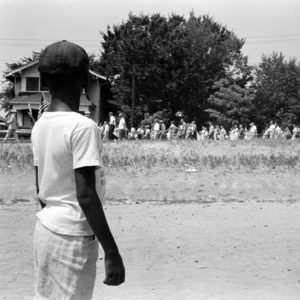calsfoundation@cals.org
Act 10 of 1958 [Affidavit Law]
A special session of the Arkansas General Assembly passed Act 10 in 1958 as one of sixteen bills designed to bypass federal desegregation orders stemming from the desegregation of Little Rock Central High School. The measure required state employees to list their political affiliations from the previous five years. Ostensibly, the act would root out subversives and other enemies of the state, but the underlying purpose was to expose National Association for the Advancement of Colored People (NAACP) members on state payrolls so that they could be fired under Act 115, a law that forbade public employment of NAACP members.
Pulaski County senator Artie Gregory designed the measure to root out subversives in the state’s educational institutions, but Governor Orval Faubus vetoed it in early 1957, citing flaws in its intent and scope. The act gained new life, however, after the Little Rock desegregation crisis six months later. Arkansas attorney general Bruce Bennett reintroduced Act 10 in 1958 as part of a package to root out and expose members of the NAACP, the group that had led the desegregation movement, whom Bennett considered to be subversive. Bennett hoped to keep the NAACP from bringing further legal suits in the state. Faubus signed the act this time as part of a massive resistance campaign against federally enforced racial desegregation.
State employees were first required to complete the Act 10 affidavit in the summer of 1959. While most quietly acquiesced, a handful flatly refused. Among them were Little Rock teachers B. T. Shelton and J. O. Powell and University of Arkansas (UA) in Fayetteville (Washington County) professor Max Carr. Shelton, Powell, and Carr would become the plaintiffs in a series of court challenges to the act backed by the NAACP and the American Association of University Professors (AAUP). Having failed in the lower courts, the cases (including Shelton v. Tucker) eventually made it to the U.S. Supreme Court in November 1960 as the combined case of Carr v. Young. The Court overturned the Arkansas affidavit law by a five-to-four majority. Justice Potter Stewart wrote for the Court, “Act 10 deprives teachers in Arkansas of their rights to personal, associational, and academic liberty, protected by the Due Process Clause of the Fourteenth Amendment from invasion by state action.”
For additional information:
Williamson-Lott, Joy Ann. “The Battle over Power, Control, and Academic Freedom at Southern Institutions of Higher Education, 1955–1965.” Journal of Southern History 74 (November 2013): 879–920.
Woods, Jeff. Black Struggle, Red Scare: Segregation and Anticommunism in the South, 1948–1968. Baton Rouge: Louisiana State University Press, 2004.
———. “‘Designed to Harass’: Act 10 in Arkansas.” Arkansas Historical Quarterly 56 (Winter 1997): 443–461.
Jeff Woods
Arkansas Tech University
 Desegregation Protest
Desegregation Protest 




This was a very hard time for everyone. I suggest the book Lions of Little Rock if you want to learn more.